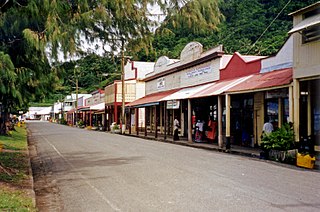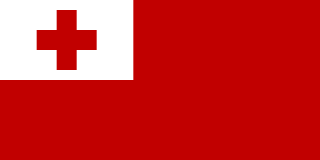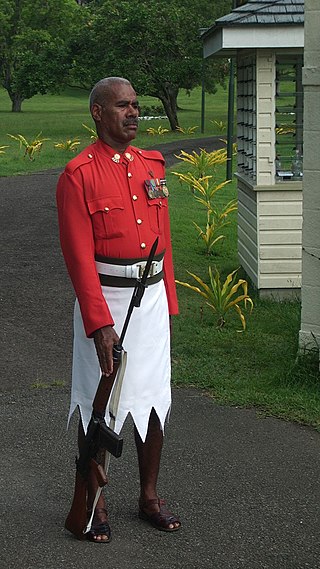
Levuka is a town on the eastern coast of the Fijian island of Ovalau, in Lomaiviti Province, in the Eastern Division of Fiji. Prior to 1877, it was the capital of Fiji. At the census in 2007, the last to date, Levuka town had a population of 1,131, about half of Ovalau's 8,360 inhabitants. It is the economic hub and the largest of 24 settlements on the island. Having been nominated decades prior, Levuka was designated a UNESCO World Heritage Site in June 2013, in recognition of the port town's exceptional testimony to the late colonial port towns in the Pacific.

Tonga sent a delegation to compete at the 2000 Summer Olympics in Sydney, Australia from 15 September to 1 October 2000. Sydney was Tonga's fifth consecutive appearance at a Summer Olympic Games. The Tongan delegation to Sydney consisted of two track and field athletes; Toluta'u Koula and Ana Siulolo Liku; and weightlifter Tevita Kofe Ngalu. Neither of the track athletes advanced beyond the first round of their events, while Ngalu came 13th in the men's 105 kg category.

Virisila Buadromo is a Fijian political activist and former journalist, who was the executive director of the Fiji Women's Rights Movement (FWRM) from 2001 to 2015. She used to be the news director for FM96.

A grass skirt is a costume and garment made with layers of plant fibres such as grasses and leaves that is fastened at the waistline.

Fiji made its Olympic Games debut at the 1956 Summer Games. It has competed at fourteen Summer Games and three Winter Games. Its athletes have taken part in archery, athletics, boxing, football, judo, sailing, shooting, swimming, weightlifting and rugby sevens.

Fiji competed at the 2011 Pacific Games in Nouméa, New Caledonia between August 27 and September 10, 2011. As of June 28, 2011 Fiji has listed 425 competitors.

Fiji competed at the 2012 Summer Olympics in London, United Kingdom from July 27 to August 12, 2012. This was the nation's thirteenth appearance at the Olympics, having appeared at every games since 1956 except the 1964 Summer Olympics in Tokyo, and the 1980 Summer Olympics in Moscow due to its support for the American-led boycott.

Tonga participated in the 2012 Summer Paralympics in London, United Kingdom, from August 29 to September 9, 2012. Their participation marked their fourth consecutive Summer Paralympics appearance since their début at the 2000 Summer Paralympics in Sydney. Tonga was represented by the Tonga National Paralympic Committee, and was one of the 45 participating countries that sent only a single athlete. Tonga has always sent only a single athlete from Sydney 2000 to London 2012. Tonga National Paralympic Committee sent a delegation of three people, including one athlete. The sole athlete to represent the nation was ʻAloʻalo Liku, who participated in javelin and discus throw. Liku was the country's flag-bearer during the Games' opening ceremony. Tonga did not win a medal at these Games, however Liku finished with seasonal bests in both the events.

Rugby sevens was played at the Olympics for the first time at the 2016 Summer Olympics, with both men's and women's contests. It was added to the Olympics following the decision of the 121st IOC Session in Copenhagen in October 2009. The champions for the inaugural rugby sevens tournament in 2016 were Fiji for the men and Australia for the women. Prior to 2016, 15-a-side matches were played in 1900, 1908, 1920, and 1924.
Manueli Tulo is a Fijian weightlifter who competed for Fiji at the 2012 Summer Olympics and at the 2016 Summer Olympics. Both times he competed in the Men's 56kg event, finishing 13th both times. His wife Maria Liku also represented Fiji in weightlifting at the 2012 Summer Olympics, while his younger sister, Seruwaia Malani, competed at the 2014 Commonwealth Games.

Nayau is an island in Fiji, a member of the Lau archipelago. It was the ancestral island of the Vuanirewa Clan, who were later exiled to the nearby island of Lakeba.

A sulu is a kilt-like garment worn by men and women in Fiji since colonisation in the nineteenth century.

Fiji competed at the 2016 Summer Olympics in Rio de Janeiro, Brazil, from 5 to 21 August 2016. Since the nation's debut in 1956, Fijian athletes had taken part in every edition of the Summer Olympic Games, except for two occasions. Fiji failed to register any athletes at the 1964 Summer Olympics in Tokyo, and joined the American-led boycott when Moscow hosted the 1980 Summer Olympics.
Rusila Nagasau is a Fijian rugby union player. She plays rugby sevens for Fiji and was also a representative soccer player. She was included in the squad for the 2016 France Women's Sevens.
Ana Maria Roqica is a Fijian rugby sevens player. She is a member of the Fiji women's national rugby sevens team to the 2016 Summer Olympics.
Ana Siulolo Liku is a Tongan hurdler. She competed in the women's 100 metres hurdles at the 2000 Summer Olympics.

Fiji competed at the 2020 Summer Olympics in Tokyo. Originally scheduled to take place from 24 July to 9 August 2020, the Games were postponed to 23 July to 8 August 2021, because of the COVID-19 pandemic. This was Fiji's Tokyo debut after it failed to register any athletes at the 1964 Summer Olympics, also held in Tokyo. Since the nation's debut in 1956, Fijian athletes have taken part in every edition of the Summer Olympic Games, except for two occasions. Fiji failed to register any athletes at the 1964 Summer Olympics in Tokyo, and joined the American-led boycott when Moscow hosted the 1980 Summer Olympics.
Ana Maria Naimasi is a Fijian Olympic bronze medal-winning rugby union player.

Veiqia, or Weniqia, is a female tattooing practice from Fiji. Young women received veiqia at puberty, often as part of a lengthy process. The tattoos were applied by older specialist women known as daubati. Natural materials were used for the inks and to make the tools, some of which were reserved for use on high status women. The practice was prohibited under British colonial rule in the nineteenth century, but has undergone revival in the twenty-first century, led by the work of The Veiqia Project. Whilst there is an important archive of veiqia research at the Fiji Museum, western museum collections hold more artefacts relating to the practice.








